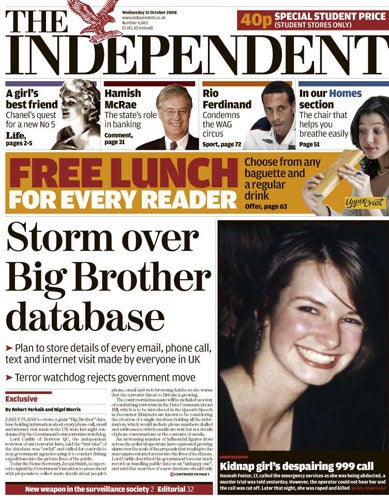'Big Brother' database plan shelved

Your support helps us to tell the story
From reproductive rights to climate change to Big Tech, The Independent is on the ground when the story is developing. Whether it's investigating the financials of Elon Musk's pro-Trump PAC or producing our latest documentary, 'The A Word', which shines a light on the American women fighting for reproductive rights, we know how important it is to parse out the facts from the messaging.
At such a critical moment in US history, we need reporters on the ground. Your donation allows us to keep sending journalists to speak to both sides of the story.
The Independent is trusted by Americans across the entire political spectrum. And unlike many other quality news outlets, we choose not to lock Americans out of our reporting and analysis with paywalls. We believe quality journalism should be available to everyone, paid for by those who can afford it.
Your support makes all the difference.The timetable for setting up a giant "Big Brother" database is slipping after the scheme was dropped from next month's Queen's Speech. The Independent has highlighted growing fury over government moves to collate details of every telephone call, email and internet visit.
Whitehall sources confirmed last night that the plans would not be included in the Queen's Speech on 3 December, in which the Government outlines its legislative programme for the next parliamentary year. Insisting they were committed to the scheme as a tool in the fight against crime and terrorism, they said a consultation paper early next year would set out options for collecting the information.
But there is no firm indication when the new Communications Data Bill will be published, raising the prospect of it being delayed until after the next general election expected in 2010.
The Bill would require telecommunications companies to keep information about calls and emails and pave the way for the information being transferred from the companies to a giant Government database.
It would list phone numbers telephoned and addresses to which emails are sent, as well as web-browsing habits, but would not details of phone conversations or contents of emails.
The Home Office has been stung by the strength of opposition. Richard Thomas, the Information Commissioner, has condemned it as a "step too far" while Lord Carlile of Berriew, the Government's terrorism watchdog, said it was "awful" as a "raw idea".
Some ministers are also worried about the wisdom of pressing ahead with the measures in the face of public hostility to the scheme, particularly in the light of a succession of embarrassing data losses by the Government.
It is one of several Bills that have fallen victim to a pruning of the Queen's Speech designed to focus ministers' attention on the recession. Six months ago Gordon Brown signalled plans for 18 Bills in his programme for next year. The number is likely to be reduced to about 14. The Bills dropped include the Heritage Protection Bill, overhauling the listing system for ancient monuments and historic buildings.
Join our commenting forum
Join thought-provoking conversations, follow other Independent readers and see their replies
Comments